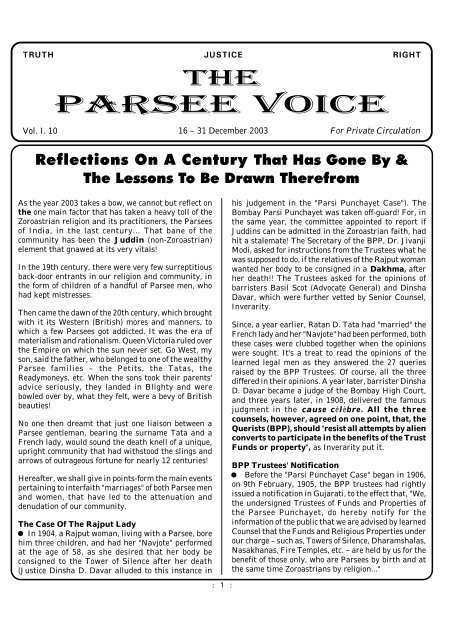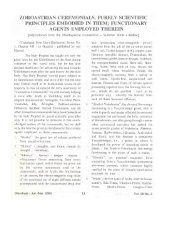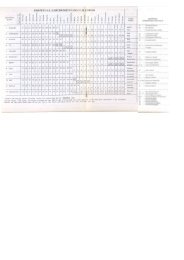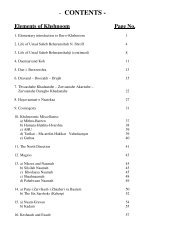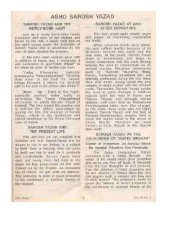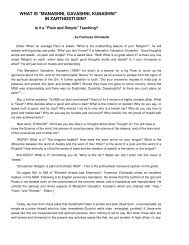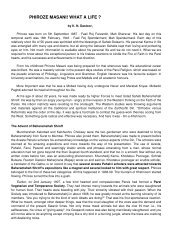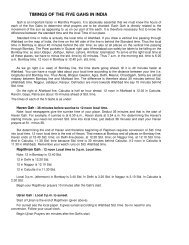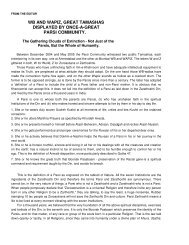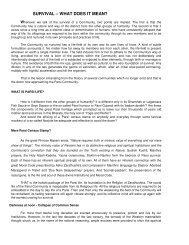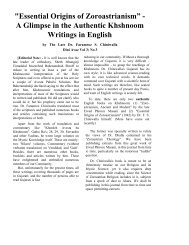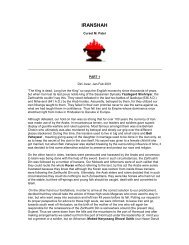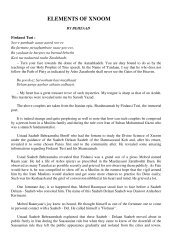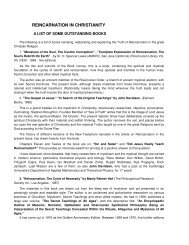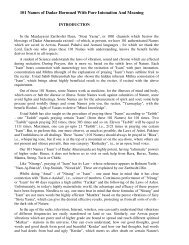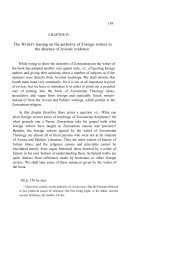Parsee Voice - Traditional Zoroastrianism: Tenets of the Religion
Parsee Voice - Traditional Zoroastrianism: Tenets of the Religion
Parsee Voice - Traditional Zoroastrianism: Tenets of the Religion
Create successful ePaper yourself
Turn your PDF publications into a flip-book with our unique Google optimized e-Paper software.
TRUTH JUSTICE RIGHT<br />
The<br />
<strong>Parsee</strong> <strong>Voice</strong><br />
Vol. I. 10<br />
16 – 31 December 2003 For Private Circulation<br />
Reflections On A Century That Has Gone By &<br />
The Lessons To Be Drawn Therefrom<br />
As <strong>the</strong> year 2003 takes a bow, we cannot but reflect on<br />
<strong>the</strong> one main factor that has taken a heavy toll <strong>of</strong> <strong>the</strong><br />
Zoroastrian religion and its practitioners, <strong>the</strong> <strong>Parsee</strong>s<br />
<strong>of</strong> India, in <strong>the</strong> last century... That bane <strong>of</strong> <strong>the</strong><br />
community has been <strong>the</strong> Juddin (non-Zoroastrian)<br />
element that gnawed at its very vitals!<br />
In <strong>the</strong> 19th century, <strong>the</strong>re were very few surreptitious<br />
back-door entrants in our religion and community, in<br />
<strong>the</strong> form <strong>of</strong> children <strong>of</strong> a handful <strong>of</strong> <strong>Parsee</strong> men, who<br />
had kept mistresses.<br />
Then came <strong>the</strong> dawn <strong>of</strong> <strong>the</strong> 20th century, which brought<br />
with it its Western (British) mores and manners, to<br />
which a few <strong>Parsee</strong>s got addicted. It was <strong>the</strong> era <strong>of</strong><br />
materialism and rationalism. Queen Victoria ruled over<br />
<strong>the</strong> Empire on which <strong>the</strong> sun never set. Go West, my<br />
son, said <strong>the</strong> fa<strong>the</strong>r, who belonged to one <strong>of</strong> <strong>the</strong> wealthy<br />
<strong>Parsee</strong> families – <strong>the</strong> Petits, <strong>the</strong> Tatas, <strong>the</strong><br />
Readymoneys, etc. When <strong>the</strong> sons took <strong>the</strong>ir parents'<br />
advice seriously, <strong>the</strong>y landed in Blighty and were<br />
bowled over by, what <strong>the</strong>y felt, were a bevy <strong>of</strong> British<br />
beauties!<br />
No one <strong>the</strong>n dreamt that just one liaison between a<br />
<strong>Parsee</strong> gentleman, bearing <strong>the</strong> surname Tata and a<br />
French lady, would sound <strong>the</strong> death knell <strong>of</strong> a unique,<br />
upright community that had withstood <strong>the</strong> slings and<br />
arrows <strong>of</strong> outrageous fortune for nearly 12 centuries!<br />
Hereafter, we shall give in points-form <strong>the</strong> main events<br />
pertaining to interfaith "marriages" <strong>of</strong> both <strong>Parsee</strong> men<br />
and women, that have led to <strong>the</strong> attenuation and<br />
denudation <strong>of</strong> our community.<br />
The Case Of The Rajput Lady<br />
• In 1904, a Rajput woman, living with a <strong>Parsee</strong>, bore<br />
him three children, and had her "Navjote" performed<br />
at <strong>the</strong> age <strong>of</strong> 58, as she desired that her body be<br />
consigned to <strong>the</strong> Tower <strong>of</strong> Silence after her death<br />
(Justice Dinsha D. Davar alluded to this instance in<br />
: 1 :<br />
his judgement in <strong>the</strong> "Parsi Punchayet Case"). The<br />
Bombay Parsi Punchayet was taken <strong>of</strong>f-guard! For, in<br />
<strong>the</strong> same year, <strong>the</strong> committee appointed to report if<br />
Juddins can be admitted in <strong>the</strong> Zoroastrian faith, had<br />
hit a stalemate! The Secretary <strong>of</strong> <strong>the</strong> BPP, Dr. Jivanji<br />
Modi, asked for instructions from <strong>the</strong> Trustees what he<br />
was supposed to do, if <strong>the</strong> relatives <strong>of</strong> <strong>the</strong> Rajput woman<br />
wanted her body to be consigned in a Dakhma, after<br />
her death!! The Trustees asked for <strong>the</strong> opinions <strong>of</strong><br />
barristers Basil Scot (Advocate General) and Dinsha<br />
Davar, which were fur<strong>the</strong>r vetted by Senior Counsel,<br />
Inverarity.<br />
Since, a year earlier, Ratan D. Tata had "married" <strong>the</strong><br />
French lady and her "Navjote" had been performed, both<br />
<strong>the</strong>se cases were clubbed toge<strong>the</strong>r when <strong>the</strong> opinions<br />
were sought. It's a treat to read <strong>the</strong> opinions <strong>of</strong> <strong>the</strong><br />
learned legal men as <strong>the</strong>y answered <strong>the</strong> 27 queries<br />
raised by <strong>the</strong> BPP Trustees. Of course, all <strong>the</strong> three<br />
differed in <strong>the</strong>ir opinions. A year later, barrister Dinsha<br />
D. Davar became a judge <strong>of</strong> <strong>the</strong> Bombay High Court,<br />
and three years later, in 1908, delivered <strong>the</strong> famous<br />
judgment in <strong>the</strong> cause célèbre. All <strong>the</strong> three<br />
counsels, however, agreed on one point, that, <strong>the</strong><br />
Querists (BPP), should "resist all attempts by alien<br />
converts to participate in <strong>the</strong> benefits <strong>of</strong> <strong>the</strong> Trust<br />
Funds or property", as Inverarity put it.<br />
BPP Trustees' Notification<br />
Before <strong>the</strong> "Parsi Punchayet Case" began in 1906,<br />
on 9th February, 1905, <strong>the</strong> BPP trustees had rightly<br />
issued a notification in Gujarati, to <strong>the</strong> effect that, "We,<br />
<strong>the</strong> undersigned Trustees <strong>of</strong> Funds and Properties <strong>of</strong><br />
<strong>the</strong> <strong>Parsee</strong> Punchayet, do hereby notify for <strong>the</strong><br />
information <strong>of</strong> <strong>the</strong> public that we are advised by learned<br />
Counsel that <strong>the</strong> Funds and Religious Properties under<br />
our charge – such as, Towers <strong>of</strong> Silence, Dharamshalas,<br />
Nasakhanas, Fire Temples, etc. – are held by us for <strong>the</strong><br />
benefit <strong>of</strong> those only, who are <strong>Parsee</strong>s by birth and at<br />
<strong>the</strong> same time Zoroastrians by religion..."<br />
•
Queries were <strong>the</strong>n raised about those born <strong>of</strong> <strong>Parsee</strong><br />
fa<strong>the</strong>rs and alien mo<strong>the</strong>rs, who were very very few in<br />
number. Yet, <strong>the</strong> <strong>the</strong>n BPP trustees bungled,<br />
presumably under pressure, and got ano<strong>the</strong>r<br />
notification issued over <strong>the</strong>ir Secretary's (Jivanji<br />
Modi's) signature that <strong>the</strong>y, too, were entitled to<br />
<strong>the</strong> benefit <strong>of</strong> <strong>the</strong>ir funds and properties! 98 years<br />
later, this colossal blunder, which was also<br />
perpetuated in <strong>the</strong>ir affidavit before <strong>the</strong> High<br />
Court in <strong>the</strong> Parsi Punchayet Case, has become a<br />
huge thorn in <strong>the</strong> fabric <strong>of</strong> our community, giving<br />
<strong>Parsee</strong> men a veritable licence, to go ahead and<br />
enter into alliances with non-<strong>Parsee</strong> women,<br />
brazenly!<br />
Davar-Beaman Judgment<br />
•The<br />
Suit No.689 was filed in <strong>the</strong> Bombay High Court,<br />
in 1906, under Sec. 539 <strong>of</strong> <strong>the</strong> Civil Procedure Code.<br />
Ironically, this suit was not filed by <strong>the</strong> aggrieved party,<br />
<strong>the</strong> French lady, but by a set <strong>of</strong> individuals, who were<br />
strongly influenced by <strong>the</strong> materialistic winds from <strong>the</strong><br />
West. Again, in <strong>the</strong> beginning, <strong>the</strong> case was to be heard<br />
by Dinsha Davar alone! The plaintiffs, however, felt<br />
that <strong>the</strong> case should be heard by a bench <strong>of</strong> two. The<br />
defendants (BPP) opposed. Justice Davar himself<br />
recommended to <strong>the</strong> Chief Justice to appoint ano<strong>the</strong>r<br />
colleague with him. So, Justice Beaman was appointed.<br />
The case came up for hearing two years later, in 1908<br />
and two concurring judgments were separately<br />
delivered on 27th November, 1908.<br />
Only Two Points At Issue<br />
The judges decided only on, (a) whe<strong>the</strong>r <strong>the</strong> BPP<br />
Trustees were validly appointed; and (b) whe<strong>the</strong>r a non-<br />
<strong>Parsee</strong> Zoroastrian "converted" to <strong>Zoroastrianism</strong> is<br />
entitled to <strong>the</strong> benefit <strong>of</strong> <strong>the</strong> religious institutions and<br />
funds mentioned in <strong>the</strong> plaint.<br />
As regards <strong>the</strong> latter, Davar J. maintained that, <strong>the</strong><br />
right to file a suit vested only in <strong>the</strong> person that is<br />
wronged, whereas, <strong>the</strong> plaintiffs were all <strong>Parsee</strong><br />
Zoroastrians by birth. His judgment ran into 121 pages,<br />
which is considered "a treatise on <strong>the</strong> legal and religious<br />
rights and customs and <strong>the</strong> social fabric <strong>of</strong> <strong>the</strong><br />
community."<br />
Justice Davar's concluding remarks were : "The Parsi<br />
community consists <strong>of</strong> Parsis who are descended from<br />
<strong>the</strong> original Persian emigrants, and who are born <strong>of</strong><br />
both Zoroastrian parents, and who pr<strong>of</strong>ess <strong>the</strong><br />
Zoroastrian religion, <strong>the</strong> Iranis from Persia pr<strong>of</strong>essing<br />
<strong>the</strong> Zoroastrian religion, who came to India, ei<strong>the</strong>r<br />
temporarily or permanently, and <strong>the</strong> children <strong>of</strong> Parsi<br />
fa<strong>the</strong>rs by alien mo<strong>the</strong>rs, who have been duly and<br />
properly admitted into <strong>the</strong> religion."<br />
: 2 :<br />
From this brief history <strong>of</strong> <strong>the</strong> judgment, two-three<br />
fallacies that are being trotted out today, need to be<br />
emphatically mentioned: (1) There is no judgment<br />
which states that children <strong>of</strong> <strong>Parsee</strong> fa<strong>the</strong>rs and<br />
alien mo<strong>the</strong>rs can be accepted in <strong>the</strong> religion. This<br />
big mistake was already made in <strong>the</strong> affidavit filed<br />
before <strong>the</strong> learned judges, by <strong>the</strong> Bombay Parsi<br />
Punchayet. (2) Even before <strong>the</strong> actual hearing, <strong>the</strong><br />
Samast Anjuman Meeting <strong>of</strong> 16th April, 1905,<br />
called by <strong>the</strong> BPP, refused to accept any<br />
concessions in Juddin marriages and Navjotes,<br />
which decision was alluded to by Justice Davar in his<br />
judgment. (3) The learned judge had made it<br />
categorically clear that, on <strong>the</strong> evidence placed<br />
before him, a mere Navjote cannot permit <strong>the</strong><br />
child <strong>of</strong> a non-<strong>Parsee</strong> mo<strong>the</strong>r to be admitted in<br />
<strong>the</strong> Zoroastrian religion. Notice <strong>the</strong> words used:<br />
"duly and properly admitted into <strong>the</strong> religion".<br />
Women on <strong>the</strong> Warpath<br />
Just 10 years later, in 1918, <strong>the</strong> BPP Trustees were<br />
•confronted<br />
with a new, unprecedented problem: A<br />
<strong>Parsee</strong> woman Soonabai Edulji Mehta, taking a leaf<br />
out <strong>of</strong> some <strong>of</strong> her male confrères book, had "married"<br />
one Mr. Underwood, under <strong>the</strong> Indian Christian<br />
Marriage Act, 1872, which required only one <strong>of</strong> <strong>the</strong><br />
spouses to be a Christian. Mrs. Underwood, so her<br />
relatives claimed, had kept up her religion until she<br />
died in 1918! They wanted her body to be consigned to<br />
<strong>the</strong> Towers <strong>of</strong> Silence. The Secretary, Dr. Jivanji Modi,<br />
was stumped! He consulted <strong>the</strong> <strong>the</strong>n Trustees and got<br />
<strong>the</strong> body consigned to <strong>the</strong> chotra (an unconsecreted<br />
Dakhma: <strong>the</strong>re is a square one at Mumbai's<br />
Doongerwadi).<br />
The trustees consulted <strong>the</strong> Advocate General, Sir<br />
Thomas Strangman, who confirmed <strong>the</strong> step. His<br />
argument was that, even if she continued to<br />
remain a Zoroastrian, she went out <strong>of</strong> <strong>the</strong><br />
community having married a non-Parsi.<br />
The argument was based on <strong>the</strong> judgment <strong>of</strong> Justice<br />
Beaman in <strong>the</strong> Parsi Punchayet Case, that, "after <strong>the</strong>y<br />
settled down in India, <strong>the</strong> <strong>Parsee</strong>s came to regard<br />
<strong>the</strong>mselves as a caste ... Marriage by a female<br />
member <strong>of</strong> <strong>the</strong> community with an outsider<br />
would, <strong>the</strong>refore, ipso facto, place her outside <strong>the</strong><br />
community." Sir Strangman went on to add that<br />
Justice Davar "would not have regarded Mrs.<br />
Underwood as a member <strong>of</strong> <strong>the</strong> <strong>Parsee</strong><br />
community." Had Mrs. Underwood married under <strong>the</strong><br />
Special Marriage Act <strong>of</strong> 1872, she would have<br />
automatically renounced her religion.<br />
•<br />
Again, 10 years later, in 1928, ano<strong>the</strong>r <strong>Parsee</strong> woman,<br />
had married a Frenchman in <strong>the</strong> American Christian
Church and became Madame Guevret! The fascination<br />
for French women and men with some <strong>Parsee</strong>s <strong>of</strong> those<br />
days, is fascinating, indeed! This Mithibai Guevret (how<br />
did <strong>the</strong> "natives" pronounce her name?) asked Sir<br />
Dinshaw Mulla's opinion about her status. He felt that<br />
"she is, <strong>the</strong>refore, still a Parsi by Race and a Zoroastrian<br />
by religion... unless it be shown that ei<strong>the</strong>r according<br />
to <strong>the</strong> tenets <strong>of</strong> <strong>the</strong> Zoroastrian religion or according to<br />
<strong>the</strong> custom <strong>of</strong> <strong>the</strong> community she ceased to be a member<br />
<strong>of</strong> <strong>the</strong> community on a marriage with one outside <strong>the</strong><br />
community."<br />
A thousand pities that instead <strong>of</strong> settling <strong>the</strong><br />
matter <strong>the</strong>re and <strong>the</strong>n, by adducing incontrovertible<br />
evidence from Zoroastrian texts,<br />
traditions and practices, in a court <strong>of</strong> law, <strong>the</strong><br />
elders <strong>of</strong> <strong>the</strong> community, including <strong>the</strong> BPP<br />
trustees and <strong>the</strong> leading Athornans, including <strong>the</strong><br />
High Priests, dragged <strong>the</strong>ir feet by merely passing<br />
resolutions at Samast Anjuman and o<strong>the</strong>r<br />
meetings!<br />
In <strong>the</strong> meanwhile, <strong>the</strong>re was <strong>the</strong> Bella case <strong>of</strong> Rangoon,<br />
in <strong>the</strong> twenties, <strong>the</strong> Bansda Navjotes, <strong>of</strong> <strong>the</strong> forties, etc.<br />
The small crack in <strong>the</strong> door at <strong>the</strong> time <strong>of</strong> <strong>the</strong> Parsi<br />
Punchayet case, had been converted into a yawning<br />
[The following letter, written by Ms. Yasmin Pavri, goes<br />
well with our lead article in this issue. This is how an<br />
average <strong>Parsee</strong> feels about <strong>Parsee</strong> women marrying outside<br />
<strong>the</strong> community. She addresses <strong>the</strong> letter to those<br />
contemplating non-Zoroastrian marriages].<br />
Dear Friends,<br />
At one time in your life, you decided to marry a person <strong>of</strong><br />
your choice – who happened to be a 'non-Parsi', a 'non-<br />
Zoroastrian', a worthy person no doubt, practising his own<br />
good religion. But, each religion, community has its own<br />
codes, rules, which are in-built or practised over centuries<br />
– <strong>the</strong>y must be understood and respected. No religion<br />
tolerates violation <strong>of</strong> <strong>the</strong>se.<br />
At <strong>the</strong> time you made your decision, and probably, also<br />
married as per <strong>the</strong> rites <strong>of</strong> <strong>the</strong> religion <strong>of</strong> your spouse, you<br />
must have been aware – as you should have been – that,<br />
this action <strong>of</strong> yours would entail giving up your rights as a<br />
Parsi Zoroastrian, <strong>of</strong> entry into our fire temples, partaking<br />
in or presence at religious ceremonies and entry into <strong>the</strong><br />
Dokhma after death. Yet you opted for <strong>the</strong> "marriage" <strong>of</strong><br />
your choice, <strong>the</strong>reby, relinquishing your rights to <strong>the</strong><br />
religious institutions, places <strong>of</strong> worship <strong>of</strong> <strong>the</strong> religion into<br />
which you were born and into which you were initiated at<br />
<strong>the</strong> time <strong>of</strong> your 'Navjote'.<br />
Yet, now, you desire to assert your right and adoration for<br />
your religion – at what expense? Have you for a moment<br />
You're Telling Us!<br />
: 3 :<br />
chasm by <strong>the</strong> time India got its independence. Many<br />
children <strong>of</strong> non-<strong>Parsee</strong> mo<strong>the</strong>rs had got entry into <strong>the</strong><br />
community, without as much as a "by your leave.."<br />
Special Marriage Act, 1954<br />
After independence, <strong>the</strong> alarm-bells were sounded<br />
in <strong>the</strong> form <strong>of</strong> <strong>the</strong> above Act, which did away with <strong>the</strong><br />
renunciation <strong>of</strong> one's religion at <strong>the</strong> time <strong>of</strong> <strong>the</strong> civil<br />
marriage, a clause which was <strong>the</strong>re in <strong>the</strong> earlier Act <strong>of</strong><br />
1872. At that time, <strong>the</strong> BPP trustees were earnestly<br />
urged by right-thinking orthodox <strong>Parsee</strong>s to seek<br />
exemption from this Act.<br />
•<br />
But, as we know today, no one batted an eyelid. The<br />
floodgates <strong>of</strong> inter-married Zoroastrians had opened!<br />
The downright dadagiri <strong>of</strong> <strong>Parsee</strong> women marrying<br />
outsiders, with trustees <strong>of</strong> Agiaries/Atash Behrams<br />
and <strong>the</strong> trustees <strong>of</strong> <strong>the</strong> BPP, had begun!<br />
(TO BE CONTINUED)<br />
(In our next issue, "The Hypocrisy <strong>of</strong> <strong>Parsee</strong>s married<br />
outside...")<br />
[We regret, that <strong>the</strong> sequel to <strong>the</strong> article, "BPP, FPZAI<br />
& The World Body", has to be postponed to our next<br />
New Year issue, because <strong>of</strong> constraints <strong>of</strong> space. –<br />
Editor].<br />
considered <strong>the</strong> consequences to <strong>the</strong> religion and <strong>the</strong><br />
community? Have you examined your own desires, motives<br />
with a sincere heart and mind, that you with to tear asunder<br />
<strong>the</strong> tradition and <strong>the</strong> community so that you get <strong>the</strong><br />
satisfaction <strong>of</strong> visiting <strong>the</strong> fire-temple, or being present at a<br />
ceremony once in a way?<br />
When you implicitly gave up your rights to marry, knowing<br />
<strong>the</strong> rules <strong>of</strong> <strong>the</strong> community, you did not think seriously. So<br />
now, why create havoc for all else? What self interest<br />
prompts you to do so? Remember, our ancestors who<br />
forsake everything to preserve <strong>the</strong>ir faith which has<br />
survived – which mainly due to our strict regulatory codes<br />
and discipline stands to this day! Do you realize what your<br />
acts <strong>of</strong> transgression can do?<br />
If you have accepted your spouse with his worthy religion,<br />
why can't you accept <strong>the</strong> same for your child? Do you want a<br />
'Navjote' for <strong>the</strong> grand function which goes with it?<br />
If you desire to 'gate-crash' or have a 'back-door' entry,<br />
remember, you are causing a grave disturbance and you will<br />
be fooling nei<strong>the</strong>r God nor yourself.<br />
You have made a bed <strong>of</strong> roses for youself, be happy<br />
and content <strong>the</strong>rein and let us remain happy and<br />
undisturbed in ours!<br />
Yasmin Pavri
A¡L$ k]$u\u \[p¬ Aph¡gp¬ Sy>Øu_ g”p¡ A_¡ _hÅ¡[p¡A¡ `pfku L$p¡d_¡<br />
kÐep_piu_u MpCdp¬ ^L¡$gu ]$u^u R>¡!<br />
Adp¡ ApS>¡ S>¡ L$l¡hp dp¬NuA¡ R>uA¡, [¡ ANpD OZuhpf QQp®C<br />
Ney¬ R>¡. [¡ R>[p¬, Äepf¡ lpgdp¬ dm¡gu bpfX$p¡gudp¬ a¡X$f¡i__u<br />
kcpdp¬, L$p¡C cpCAp¡A¡ hue® b¢L$ (Sperm Bank) [¡dS><br />
arg[ L$fhp_u q¾$ep dpV¡$_u q¼gr_L$ (Fertility Clinic)<br />
Ecu L$fhp_u hp[ hl¡[u L$fu, [¡dS> L$p¡C buÅAp¡A¡ Ly$Vy¬$b]$uW$<br />
3-4 afT¬]$p¡ Ecp L$fhp_u hp[ L$fu, L¡$ S>¡\u `pfku L$p¡d_u<br />
Apbp]$u h^¡, Ðepf¡ Ad_¡ kpQu fu[¡S> Apòe® gpÁey¬! L$pfZ<br />
L¡$ Ap b^p¬ ap¡L$V$_p¬ ap¬ap¬S> R>¡, A¡V$gy¬S> _rl, Apdp¬_u L$p¡CL$<br />
S>f\p¡í[u ^d®_u `Z rhê$Ý^_u âh©r[Ap¡ R>¡.<br />
Ap cpCAp¡ `p¡[¡S> L$byg L$f¡ R>¡ L¡$ L$p¡ddp¬ Ly¬$hpfp`Ϭ A_¡<br />
dp¡V$u Ddf¡ \[p g”p¡_y¬ âdpZ OϬ h^u Ney¬ R>¡, [p¡ `R>u,<br />
3-4 bÃQp¬Ap¡ Ly$Vy¬$b]$uW$ ¼ep¬\u Ecp¬ \C iL¡$?<br />
Adpfu _pQuT A½$g âdpZ¡ [p¡ S>¡ [p[u S>ê$f R>¡ [¡ L$p¡C<br />
`Z cp¡N¡, Sy>Øu_ g”p¡ \[p¬ AV$L$phhp_u. Ap q]$ipdp¬ OϬ<br />
gMpey¬ A_¡ bp¡gpey¬ R>¡, `f¬[y, S>¡ hp[ Adp¡ ApS>¡ ]$p¡lfphhp<br />
dp¬NuA¡ R>uA¡ [¡ A¡ L¡$, S>f\p¡í[u bp_yAp¡ S>¡Ap¡ Sy>Øu_ g”<br />
L$f¡ R>¡ [¡Ap¡_¡ L$p¡C `Z rlkpb¡ hpmhp ep L$p¡d blpf fpMhp.<br />
ApS>_p¬ S>dp_pdp¬ [¡ L¡$d L$fhy¬, [¡_u A]$_p L$p¡rii Adp¡ A[°¡<br />
L$e£ R>uA¡.<br />
(1) `fL$p¡d_¡ `fZ¡gu S>f\p¡í[u bp_yAp¡ D`f ANpD L¡$V$gpL$<br />
âr[b¬^p¡ l[p. S>¡ riõ[ [¡ h¡mp_p¬ hpmuAp¡, dp-bp`p¡$<br />
`p¡[p_p¬ Ofdp¬ fpM[p l[p [¡dS> S>¡ k¬ed [¡ h¡mp_p¬ dy¬bC<br />
`pfku `¬Qpe[_p¬ V²$õV$uAp¡ [¡dS> ArNepfu Ap[ibl¡fpd<br />
_p¬ dy[h‰uAp¡ `p¡[p_u k¬õ\pdp¬ gpìhp âeÐ_ L$f[p l[p,<br />
[¡_¡ gu^¡ Aphu Ap¡f[p¡ A¬Ly$idp¬ fl¡[u l[u.<br />
(2) ApS>¡ [¡ hM[ _\u füp¡. ApS>¡ [p¡ bk ""gph R>fu,<br />
_pL$ L$p`y¬!'' _u h[®Ï¬L$ Å¡hp dm¡ R>¡. ""[d¡ L$p¡Z Ad_¡<br />
L$l¡hphpmp! h^y AhpS L$fip¡, [p¡ _p¡qV$k dp¡L$gphui!'' Aphu<br />
Mp¡V$u ^dL$u\u, L$d_kub¡, Ap`Zp¬ `pL$ dL$p__p¬ V²$õV$uAp¡<br />
X$fu S>C _d[y¬ Å¡M¡ R>¡!<br />
Correspondence regarding administrative matters may please be sent to :<br />
"The <strong>Parsee</strong> <strong>Voice</strong>", Post Bag No. 6317, Delisle Road Post Office, Mumbai 400 013.<br />
All editorial correspondence may please be sent to <strong>the</strong> Editor's address given at <strong>the</strong> bottom <strong>of</strong> this page or at <strong>the</strong><br />
e-mail address mentioned <strong>the</strong>re.<br />
Edited, printed and published by Adi F. Doctor, 803-C, Dr. B. Ambedkar Road, Dadar, Mumbai 400 014. Associate Editor : H.M. Mistry<br />
Printed at H.J. Commercial Printers at 329 Milan Industrial Estate, T.J. Marg, Cotton Green (W), Mumbai 400 033.<br />
e-mail: <strong>the</strong>parseevoice@yahoo.com<br />
: 4 :<br />
(3) Ap Sy>Øu_ g” L$f_pf bp_yAp¡ A¡V$gp c|gphpdp¬ `X¡$gp¬<br />
R>¡ L¡$ [¡Ap¡_¡ A¡V$gu kfm hp[_u Mbf _\u lp¡[u L¡$ ""bpmL$_p¡<br />
^prd®L$ A¡[¡L$p]$ Ecp¡ L$fhp_p¡ Ly$]$f[u lL$ bp`_p by__¡S><br />
dm¡gp¡ R>¡. Äepf¡ bp`_p¡ ^d® Sy>]$p¡ lp¡e, Ðepf¡ bpmL$_p¡ ^prd®L$<br />
A¡[¡L$p]$ bp`_y¬ by_S> dyL$ff L$f¡ R>¡.''<br />
(4) `fL$p¡du d]$p£ kp\¡ År[e cp¡NhV$p¡ L$fhp\u, Mp¡f¡lp¡_u<br />
c¡mdc¡m `¡]$p `X¡$ R>¡. d]®$_y¬ Mp¡f¡l, Ap¡f[_p¬ Mp¡f¡l D`f<br />
Npg¡b Apìhp\u, [¡ S>f\p¡í[u b_y_y¬ Mp¡f¡l S>¡ _hÅ¡[ hM[¡<br />
d¡mh¡gy¬ l[y¬, [¡ _ô$ \[y¬ Åe R>¡!<br />
(5) Aphu A_¡L$ bpb[p¡ S>¡ S>f\p¡í[u ]$u_dp¬ `X¡$gu R>¡,<br />
[¡_p L$pÃQpdp¬ L$pÃQp Aæepk hNf, ApS>¡, `fL$p¡du d]$p£_¡<br />
`fZ¡gu S>f\p¡í[u Ap¡f[p¡, d_dp¬ A¡hp ap¬L$pAp¡ fpMu_¡, AdyL$<br />
^¬yCdp¬ af¡ R>¡ L¡$, ""Adp¡ k]$fp¡-L$í[u `l¡fuA¡ R>¡A¡, A¡V$g¡<br />
Adp¡ S>f\p¡í[uS> L$l¡hpCA¡.'' Aphu Mp¡V$u DÝY$[pC_¡ hmu,<br />
cp¬Np hpk_p¬ V¡$L$p¡ Ap`_pfpAp¡_u `Z L$du _\u!<br />
(6) Äep¬ ky^u dy¬bC_u `pfku `¬Qpe[_p¬ [¡dS> ^prd®L$<br />
dL$p_p¡_p¬ V²$kV$uAp¡, _¥r[L$ q¬ld[ b[phu, Aphu `fL$p¡ddp¬<br />
`fZ¡gu Ap¡f[p¡_¡ [¡dS> [¡Ap¡_p¬ bpmL$p¡_¡ L$p¡d_u ^prd®L$<br />
k¬õ\pAp¡dp¬\u bpL$p[ fpMi¡ _q¬l, [p¡ Ap N¬cuf âñ h^y<br />
rhL$ki¡. Apdp¬ S>ê$f R>¡ a¼[ _¥r[L$ bm_p¡.<br />
Ad_¡ cpf`|h®L$ L$lu ]¡$hp ]$p¡ L¡$ ApS>¡ S>¡ Aphu Ap¡f[p¡ ^dL$uAp¡<br />
Ap`¡ R>¡, [¡ kph `p¡½$mS> R>¡! Å¡ A¡Ap¡ L$p¡V®$ S>hp_u ^dL$u<br />
`Z Ap`¡, [p¡ [¡d L$fhp ]$p¡! A¡Ap¡ L$]$u aphhp_pS> _\u! Ap<br />
A¡L$S> kl¡gu QuS> R>¡ S>¡_¡\u L$p¡d_u Ap¡R>u \[u hõ[u_p¡<br />
khpg _p¡ L¡$V$g¡ A¬i¡ S>hpb dmu S>i¡.<br />
hp¬QL$p¡_¡ Adp¡ rh_¬r[ L$e£ R>uA¡, L¡$ ""`pfku hpCk''_p¬<br />
Aph[p A¬L$dp¬ _p¡ A¬N°¡Æ g¡M, S>¡ Ap bpb[ `f rhõ[pfu_¡<br />
âL$pi _p¬Mi¡, [¡ S>ê$f Ýep_\u hp¬Q¡, A_¡ `pfku L$p¡d dp¬\u<br />
A¡hp¡ L$p¡C k`|[ Ecp¡ \pe S>¡ L$p¡C `Z Å[_u Ap bp_yAp¡_u<br />
`p¡½$m ^dL$uAp¡\u X$f¡ _q¬l! Ap L$pd ^pfhpdp¬ Aph¡ R>¡ A¡hy¬<br />
AOfy¬ R>¡S> _q¬l!


